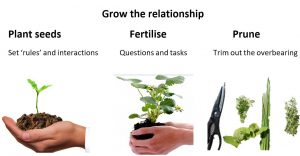What makes a good conversation? (Anytime, anywhere)
Being heard and truly understood: “I felt as if you really knew what it was like for me”
Feeling valued – even if you disagreed: “My point of view was different but I felt it was still respected”
Time to express yourself: “I wasn’t rushed ; I could say exactly what I needed”
The other person thought about what you said: “They were trying to really unpack what I was saying”
Learning something new: “I hadn’t realised that before. It was interesting to see it that way.”
Connecting with similar ideas/values: “I felt I had met someone who came from my side of the tracks”
Honesty and authenticity: “There was no BS, no trying to impress each other. It was real.”
Being a focus, the centre of attention: “I felt like I was someone quite important.
Even if it was only for a while”
What makes a good facilitator of online conversations?
- A good listener
- Curious, interested in people
- Doesn’t judge
- Open to new ideas
- Sensitive and respectful
- Able to manage difficult situations
Compared with face to face, online groups are likely to be shorter, and the moderator will need to be more overt in managing the group process.
In particular you need to manage their attention and energy
- Stop participants being distracted and encourage mindfulness
- Give them something to focus on
- Signpost topics, so people know where they are going
- Bring in people by name
- Use your energy to change theirs
The principles of how to build an interactive and enjoyable group are the same.
• Starting with easy to answer questions “At the beginning, something everyone can talk about”
• Initially focussing on what they have in common “People look different, but they all do similar things”
• Making it OK to have (polite) disagreements “The differences make for interesting conversations”
• Encouraging the quieter ones “Some people need to be asked before they will talk”
• Discouraging the more dominant ones “Don’t let them take over.”
• Setting up interactions “Get them to relate to each other’s views.”
• Praising the group “Tell them how well they are doing”
Groups grow and develop. From the start, tell and show them how you want them to be. Be proactive in involving everyone. Ask each by name, and soon they will get the idea that they all talk.
Give them variety in questions and tasks. They can do word association, come up with metaphors, doodle stuff on a notepad if not on screen. If they are not on mobiles share images or do a poll.
Should one person become more dominant, tell them how interesting they are AND that it is your job to hear from everybody. “Sorry to interrupt, Jack, what you have been saying is really interesting. And as you know, I have to hear from everyone, so can I find out what Jill thinks about this?”
Make time for a good ending. “Is there anything you would like to say that you have not had a chance to say?”
“Could you sum up your experience today in a couple of words?”
